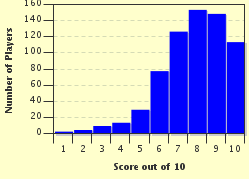Quiz Answer Key and Fun Facts
1. The late 18th and early 19th centuries are often referred as the Industrial Revolution. In which industry did this era of modernization start on a large and ongoing scale?
2. In AD 476 the last Western emperor, Romulus Augustulus was overthrown by Odoacer, a barbarian. This is considered by some to be the possible start of which European era?
3. Of the Bronze Age, Iron Age, and Copper Age, which ended the most recently?
4. The Cold War lasted from 1947 to 1991 between blocs led by which two world superpowers?
5. The Meiji Period was a period of enlightenment and technological growth that occurred from 1868 to 1912 which brought which east Asian country to the status of a world power?
6. Which country's ancient history includes the times of "The Old Kingdom", "The Middle Kingdom" and "The New Kingdom"?
7. Which enlightened period of Chinese history is noted for, among other things, the fabulous vases that were produced and are often on display at museums?
8. What period of time are the 20th and 21st centuries in if we use the geological time scale?
9. What do we call the period between the 14th and 17th centuries in Europe that was considered a rebirth?
10. "The Jacobean Era" refers to a period of time in the early 17th century in which of the following countries?
Source: Author
dcpddc478
This quiz was reviewed by FunTrivia editor
bloomsby before going online.
Any errors found in FunTrivia content are routinely corrected through our feedback system.


